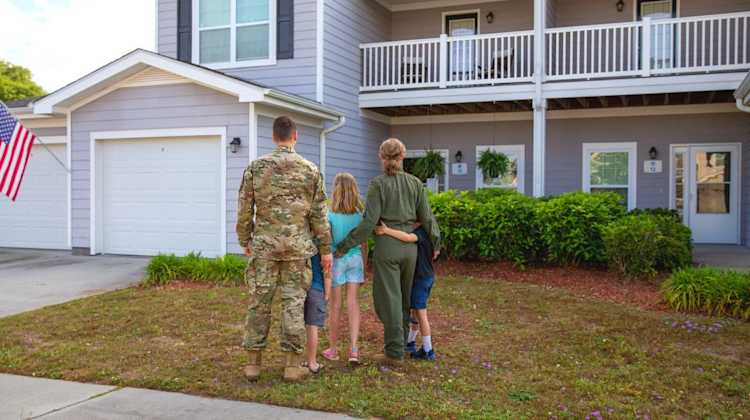PCS Q&A: Keeping the Faith After a PCS
by Lizann Lightfoot - November 4th, 2021

Our guests:
Twig Sargent, Navy Chaplain, originally from Texas, is still active duty and has been in the military for over 20 years (9 of it as a chaplain).
Megan Brown is an Air Force spouse of 15 years, a homeschool mom of 4, and a missionary with CRU Military. My first Bible study releases in May. I equip the people of God to carry His story wherever they go.
DOD updates:
Seattle and Baltimore terminals for OCONUS moves must have a negative COVID test within 48 hours of departure.
Only 24% of people actually fill out their moving survey, and those who fill it out are 96% satisfied with their move. So if you have moved within the last 12 months, fill out the moving survey on DPS so they have accurate representation of military families going through moves. The DoD uses this info to formulate regulations for future moves.
How can chaplain services help after a PCS move?
Sargent: I have worked in the base chapel in Beaufort, and the best thing they offer is a faith community of someone who understands military challenges like Op Temp (Operational Tempo). They have shared experiences and perspectives. Chapels offer a variety of denominations and services, for Protestants, Catholic, Latter-Day Saints, etc. We had a Buddhist service every week, and other services as requested. Chaplains offer a lot of counseling: marriage counseling, life events, etc. We also do a lot of work with Marine Corps Family Teambuilding doing classes like marriage prep. OCONUS, the communities are a higher percentage of the base because of the language and cultural differences off base. They may have more services like contract Youth Groups, Cadence International, CRU, etc.
Megan, what can you tell us about spiritual challenges as a military spouse?
We have moved 5 times and lived in 10 different houses. Church shopping is really overwhelming. It takes time and you keep putting it off until next weekend. I call it the PCS crash because you are just so exhausted after the PCS. Looking for a new church then feels daunting. You pack up the kids and drag everyone there, and it never really feels worth it or like a good fit. My husband is currently in Korea for a year, and he left a few weeks after our PCS. I’m a regular churchgoer, and I find myself struggling with it, so I imagine many families face the same struggles.
Sometimes we don't find our church family at all. Right now it's especially hard since most churches are virtual. What can families do to find a good option?
Brown: I believe the local church is essential in the life of believers, and there isn’t a replacement. Being part of a local body is challenging. But when you’re looking for a healthy church, focus on Acts 2:42-47. It’s a group of people committed to teaching, fellowship, corporate worship, and praying for one another. You can use the virtual experience to your advantage by watching former church services and get to know the leaders of the church. I like to call up the Pastor and just have coffee with them and get to know their style. Some focus more on community or teaching or services, so find a culture that aligns well with your family. For me, it all comes down to truth, sincere worship, meeting regularly, and sending people out. So, research churches in the local area. Commit to finding something–it may not be perfect, because there are no perfect churches or people. But there are places with an open seat where you can bring your time and abilities. That may look like virtual Bible studies, which can be a good way to connect. I’m leading a Bible study right now for hundreds of military spouses going through the Book of Acts together in a Facebook group and on Zoom.
How do you find a church that is the right fit after a move?
Sargent: You may not find the exact experience of the favorite church you grew up with. If you belong to a denomination, you can look up churches for that denomination, but it’s going to be a different experience every time. Reach out to your community before you move to ask if anyone has any connections where you are going. After you PCS, ask the chaplain on the base or in the service member’s command what the options are. Think and discuss the important essential things for you: child and youth programs, volunteer opportunities, etc. Understand the difference between essential elements and your “nice to have” requests. We aren’t all as brave as Megan and able to call up the Pastor!
Church "dating" can be a frustrating process. What can a military family do amid current church restrictions?
Sargent: Church leaders feel the same frustrations with lockdowns and restrictions on in-person meetings. Coming back to worship after that, I feel that loss and have a hunger for community. This is a season of life, but it won’t be like this forever. Are there any benefits to this change in routines? Can we re-order our priorities with a less busy schedule? Some churches are doing sacraments and communion and even baptism but in safe ways with gloves. What are some new opportunities for spiritual practices–maybe online small groups, home worship, singing songs together, etc. We can now connect with anyone online, so connect with family members too!
Brown: COVID has exposed what we really believe and value. Most of last year, churches were virtual. Some people were relieved for a bit of a break, but it quickly got old trying to build community online. There was a moment over the summer when our churches reopened, and we were singing “How Great Thou Art” and my daughter next to me grabbed my hand with her hands upraised, and I was crying real tears because there’s something special about worshipping together. If we can’t connect with the Lord in community (in person or virtual) we need to build new spiritual habits to make it happen however we can.
Sometimes we get orders to places we don't want to go. How do you help families who are stuck in that negative mindset?
Brown: There’s a certain grief we need to deal with when we get orders we don’t want. When my husband got his orders for Korea, he was just coming back from a deployment. I was really frustrated and grieving, and we all had a hard time. So the first thing is: it’s okay to not be okay. God doesn’t want your false positivity, he doesn’t want your perfection. We can trust and believe that God is in charge. For any faith, there is an element of trust. I really cling to trusting that God is going to take care of me and everything I need, so we can all focus on surrender and trust. The essential message of my book is that “God is good when things are bad.” It’s important to remember that God is with us always.
Sargent: I have my theology, but I’ve also found it useful to look in the rear-view mirror and realize how much God has supported us during difficult times. With my family, we try to reflect on what we have liked and not liked about each duty station–and we are always able to find both. So it’s important to trust and realize that every duty station is going to have both.
Remember, you can live anywhere for a few years, and maybe you’ll get a few good stories out of it!
Getting settled after a move can be very stressful and even traumatizing. How can families maintain their well-being through that process?
Sargent: We use the self-care term a lot. You need to take care of yourself and keep you grounded–physically, emotionally, mentally, and spiritually. If you have a workout routine, daily devotions, people you talk to regularly, think about whether you stopped those things recently and how you can start them up again. Also, practice forgiveness. Acknowledge that you are not going to do the move perfectly–you will lose your temper and get frustrated. Paul talks about being the “chief of sinners,” so keep that in mind and apologize to your family.
Brown: It takes about 4-6 months to get into any type of routine after a move. When you look at your to-do list, it can make you freeze because it’s so much. The list never stops. There are moments you need to focus on the essentials: what do you need THIS MOMENT? What can you release, and what will give you a little bit of a breather. For me, when I start going out of my mind, all I want is Chik-fil-a and a friend. You can’t give yourself self-care if you aren’t self-aware. Know yourself and what will give you a fresh recharge: talking to a friend? A quiet book and tea? Know your own tells. I struggle with depression, so I know my tells. If I’m binge-watching TV and staying up late, that’s Phase One. If I’m struggling to get up and get dressed, that’s Phase Two. So know yourself and what you need to get through stressful times. Look up personality charts. When your habits and character start to shift, confess what is going on in your life to other believers (friends) and share what is going on with you.
What can we do to help our kids on their spiritual journey when we have just moved to a new location?
Sargent: There are certain events that you study every year-religious holidays, dates. Use these as touchpoints to experience those days and traditions. Practice those traditions, maybe even create new traditions, but do something as a family that won’t change even if you move.
Brown: For our family, discipleship starts at home. We homeschool so I can help them create a Biblical worldview to interpret what’s around them. We want them to love well and love people and understand how their faith plays out in practicality. I grew up outside of a faith tradition and just saw the world and most people as being bad. It took the radical transformation of the Lord opening my eyes to help me see things differently. Live your faith out in front of your children and help them see what trust looks like– trust in God, and also trust in each other during a move. Your peace and compassion and any virtues you demonstrate are helpful to your children. Have an honest conversation with your spouse about what you want them to know about you and about the Lord. You don’t have to start a new thing, a new devotional, an extra task. It can really just be about living well and the example you set.
What is the number one tip or advice you want to share with families about keeping their faith during their next PCS?
Sargent: Model your faith practice as a priority for your family. You won’t live it out perfectly, but Proverbs 22:6 says “Train up a child in the way they should go,” Your children will see you and take notes on your faith and actions.
Brown: Build off what you believe in a local church. A faith family is essential for your faith, you can’t do it apart from the church. So commit to the process of finding a church home, even if it isn’t perfect and doesn’t have the exact programs you want. Find a place to worship and worship well.
Watch the full video of this webinar on our YouTube Channel here.







